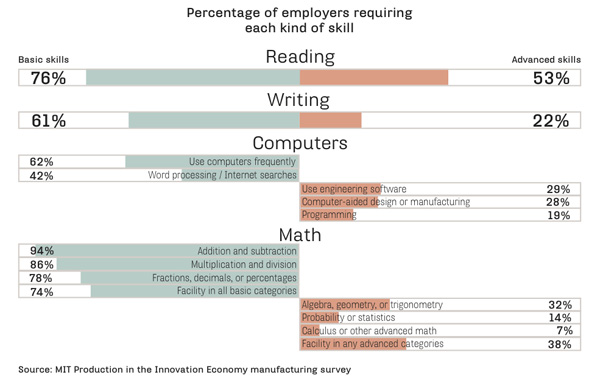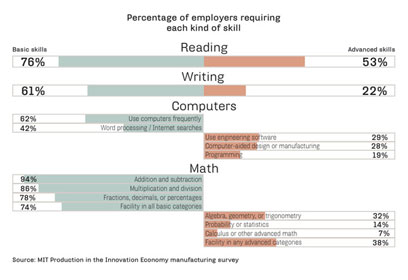
What skills do Americans need in order to get a decent job today? This question is at the core of several contentious, long-running economic and policy debates. Some explain exploding earnings inequality as a result of accelerating technology and skill demands. Others point to the changing balance of power between employees and employers as unions have shrunk and the job market has weakened.
The first narrative variously asserts that technical changes are rendering a large swath of American workers redundant or that the changes are creating a polarized world in which fewer jobs are available in the middle of the skill distribution while openings in high- and low-skill occupations are on the rise. Critics of this view note that direct measures of skill demands indicate only modest increases and that the Bureau of Labor Statistics’ employment projections generally show that most openings in the coming decade will be in middle-skill jobs.
This debate over skill demands is also relevant to the high unemployment rates that have plagued the U.S. economy since 2008. One camp blames unemployment on structural factors in the American economy, including obstacles to geographic mobility and mismatches between the skills that employers need and the skills that American workers possess. Others point to data that are more consistent with a cyclical shortfall in aggregate demand for workers—that is, the problem isn’t a lack of skilled labor but rather a slow recovery that hasn’t yet produced enough jobs. Which side is right?
To find out, we conducted a nationally representative survey of manufacturers. We asked concrete questions about the skills these manufacturers look for in “core” production workers, a group that represents about 70 percent of manufacturing employees. We found that while a strong back is clearly no longer enough, the skills that employers seek are well within reach. Basic academic skills are important. Employers want workers who can read simple instruction manuals, write short notes and reports, and add, subtract, multiply, and divide. Employers also want interpersonal skills—cooperation and teamwork. High school graduates should possess all of these skills. Many manufacturers are not interested in more advanced skills. Those that are seek community college–level abilities, and these too are attainable by the vast majority of employees.
Technology is by no means putting most jobs out of the reach of most people, and the average American worker need not inevitably be overtaken by “progress.” Once the economy is back on track—and here investment in infrastructure and support of local-government employment to stimulate aggregate demand are essential—well-designed education and training programs, along with a renewed national commitment to economic equity, will enable most Americans to succeed.







